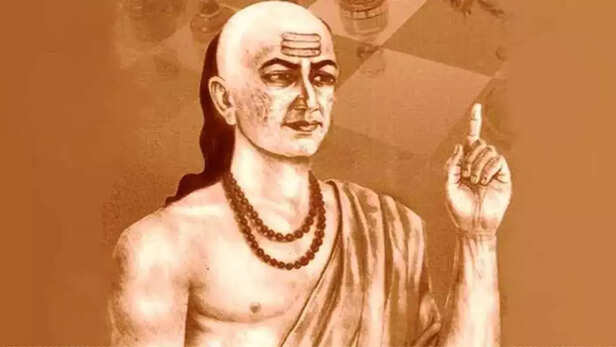Chanakya Niti: These 10 Habits Are Keeping You Poor (Even When You Work Hard)
Nidhi | Apr 12, 2025, 16:48 IST
( Image credit : Times Life Bureau, Timeslife )
Hard work alone doesn't make you wealthy. Chanakya Niti reveals that poverty often stems from deep-rooted habits and flawed mindset. In this eye-opening guide, explore the 10 toxic habits that silently hold you back from financial success—even when you're putting in the effort. Learn how to shift your thinking and habits to unlock true prosperity through the lens of ancient Indian wisdom.
“The man who draws water with a leaky vessel is not thirsty—he is simply unaware.”
Chanakya didn’t need a crown to rule empires; his wisdom held more power than armies. He believed that wealth is not earned by sweat alone, but by sense. Many work endlessly, yet remain tangled in scarcity—not because they lack effort, but because they nurture the very habits that drain their fortune.
In his Neeti, Chanakya often reminded that a foolish man blames fate, while a wise one audits his actions. The mind that chases success blindly, without wisdom or discipline, is like a chariot without reins. No matter how fast it moves, it crashes.
According to Chanakya, poverty is often a symptom—not of misfortune, but of mismanagement. A man who ignores the laws of wealth may toil forever, yet remain a servant to survival.
Here are the deeply rooted habits Chanakya cautioned against—practices that quietly keep a person poor, regardless of how hard they work:

“Not all motion is progress. A spinning top works hard, but goes nowhere.”
We live in an age where being ‘busy’ is seen as a badge of honour. But simply filling your calendar doesn’t fill your bank account. Chanakya would argue that direction beats speed—working smart always outweighs working long. When your tasks lack strategy, you're running on a treadmill, not climbing a mountain. The illusion of effort traps many in cycles of burnout. True wealth-builders invest time where it multiplies value, not just where it exhausts them.

“A full purse in an empty mind is a temporary arrangement.”
Earning is one side of the coin, but managing it is the side most ignore. Without financial literacy, income becomes an illusion of security. Chanakya believed that wealth without wisdom is a temporary blessing that soon turns into a burden. From impulse purchases to untracked spending, the undisciplined hand loses faster than it earns. If money slips through your fingers faster than you can earn it, poverty is never far behind. A wise man guards his wealth as carefully as his reputation.

“He who eats the seeds in spring will starve in winter.”
Living in the now is celebrated, but ignoring the future is dangerous. A man who spends everything he earns without planning invites chaos. Emergencies don’t knock before entering—they test your readiness. Chanakya insisted on farsightedness as a virtue of the wise. Your present pleasures shouldn’t sabotage your future peace. From building an emergency fund to investing in growth, preparation today is the price for security tomorrow.
 “Even the strongest elephant falls when it walks with the blind.”
“Even the strongest elephant falls when it walks with the blind.”
Your circle is either sharpening your mind or dulling your edge. Surrounding yourself with negative, undisciplined, or small-minded individuals quietly corrodes your potential. Chanakya urged choosing company with surgical precision—because loyalty to the wrong people leads to slow downfall. The lazy discourage ambition. The jealous mock growth. The gossipers waste time. Walk alone if you must, but never in the wrong direction with blind company.
“What good is gold to the breathless?”
Chasing success at the expense of your health is a costly exchange. A sick body, a restless mind, or a stressed spirit cannot carry wealth for long. Chanakya recognised health as true wealth—because no throne matters if the king is unwell. Hustle culture glorifies overwork, but it often breeds burnout. Your sleep, your peace, your vitality—they’re all investments too. Build your wealth, but not at the cost of your well-being. Because when health falls, everything follows.

“Opportunities don’t wait at the door; they pass by.”
The most expensive habit isn’t overspending—it’s postponing. Procrastination doesn’t just delay dreams; it silently deletes them. Chanakya preached that decisions made at the right time are more valuable than decisions made perfectly. Those who keep saying “someday” often find that day never comes. Whether it’s investing, starting, or changing habits—delayed action is slow self-sabotage. If not now, when?

“Mistakes are teachers. Ignoring them is rebellion against wisdom.”
Failure is not the enemy—repeating it blindly is. Life keeps whispering lessons, but only a few pause to listen. Chanakya emphasized introspection after every downfall. Without reflection, you're not unlucky—you're unaware. Financial losses, broken relationships, or missed chances—if they keep recurring, patterns are at play. Audit yourself. Ask the hard questions. Learning isn’t complete without correcting. Or else, your life becomes a loop dressed as progress.

“The man who waits for rain without sowing seeds praises the clouds in vain.”
Luck is a sweet lie when effort is absent. Hoping for a windfall without planting seeds of discipline is like praying with empty hands. Chanakya believed that fortune favours those who labour intelligently, not those who merely wish. Gambling, shortcuts, or emotional spending may seem like escapes—but they come back as debt. True prosperity is predictable. It rises slowly, quietly, and by those who put in the work. The stars help only those who build under the sun.
“He who buys applause with gold is rich only in noise.”
Flashing wealth to seek validation is a silent poverty of the mind. Designer tags, latest gadgets, or lavish parties may win attention, but never stability. Chanakya warned that wealth used for ego is wealth set on fire. Spend not to show, but to grow. Real affluence is discreet—it builds assets, not just aesthetics. Let your balance sheet speak louder than your wardrobe. Flaunt wisdom, not price tags.

“He who holds wealth but not its knowledge is a lamb among wolves.”
Handing your financial decisions to others without comprehension is like giving your sword to a stranger in war. Whether it’s a spouse, advisor, or friend—blind trust invites costly mistakes. Chanakya advocated awareness and accountability in money matters. Learn the basics, ask questions, stay involved. Your wealth deserves your attention more than anyone else’s intuition. Ignorance is a luxury no wealthy person can afford.
Chanakya didn’t believe that fate alone decides a man’s fortune. Instead, he taught that wealth follows those who understand its rhythm—those who combine action with awareness, vision with discipline, and effort with ethics.
If you find yourself working harder than ever, yet your pockets remain empty, perhaps it is not your fate that is flawed—it is your habits that need reform.
A wise man once said: “Do not blame the river for your thirst if you choose to walk with closed palms.”
Let Chanakya’s warnings be your mirror. Break the patterns that bind your progress. Because prosperity is not found at the end of effort—it is created by the clarity within it.
Chanakya didn’t need a crown to rule empires; his wisdom held more power than armies. He believed that wealth is not earned by sweat alone, but by sense. Many work endlessly, yet remain tangled in scarcity—not because they lack effort, but because they nurture the very habits that drain their fortune.
In his Neeti, Chanakya often reminded that a foolish man blames fate, while a wise one audits his actions. The mind that chases success blindly, without wisdom or discipline, is like a chariot without reins. No matter how fast it moves, it crashes.
According to Chanakya, poverty is often a symptom—not of misfortune, but of mismanagement. A man who ignores the laws of wealth may toil forever, yet remain a servant to survival.
Here are the deeply rooted habits Chanakya cautioned against—practices that quietly keep a person poor, regardless of how hard they work:
1. Chasing Busy Over Brilliance

Success
( Image credit : Freepik )
“Not all motion is progress. A spinning top works hard, but goes nowhere.”
We live in an age where being ‘busy’ is seen as a badge of honour. But simply filling your calendar doesn’t fill your bank account. Chanakya would argue that direction beats speed—working smart always outweighs working long. When your tasks lack strategy, you're running on a treadmill, not climbing a mountain. The illusion of effort traps many in cycles of burnout. True wealth-builders invest time where it multiplies value, not just where it exhausts them.
2. Letting Coins Slip Through Clueless Fingers

Money
( Image credit : Pexels )
“A full purse in an empty mind is a temporary arrangement.”
Earning is one side of the coin, but managing it is the side most ignore. Without financial literacy, income becomes an illusion of security. Chanakya believed that wealth without wisdom is a temporary blessing that soon turns into a burden. From impulse purchases to untracked spending, the undisciplined hand loses faster than it earns. If money slips through your fingers faster than you can earn it, poverty is never far behind. A wise man guards his wealth as carefully as his reputation.
3. Living for Today, Forgetting Tomorrow

Live Fully
( Image credit : Pexels )
“He who eats the seeds in spring will starve in winter.”
Living in the now is celebrated, but ignoring the future is dangerous. A man who spends everything he earns without planning invites chaos. Emergencies don’t knock before entering—they test your readiness. Chanakya insisted on farsightedness as a virtue of the wise. Your present pleasures shouldn’t sabotage your future peace. From building an emergency fund to investing in growth, preparation today is the price for security tomorrow.
4. Drinking Poison in the Name of Brotherhood

Friend or Enemy
( Image credit : Pexels )
Your circle is either sharpening your mind or dulling your edge. Surrounding yourself with negative, undisciplined, or small-minded individuals quietly corrodes your potential. Chanakya urged choosing company with surgical precision—because loyalty to the wrong people leads to slow downfall. The lazy discourage ambition. The jealous mock growth. The gossipers waste time. Walk alone if you must, but never in the wrong direction with blind company.
5. Trading Health for Hustle
Chasing success at the expense of your health is a costly exchange. A sick body, a restless mind, or a stressed spirit cannot carry wealth for long. Chanakya recognised health as true wealth—because no throne matters if the king is unwell. Hustle culture glorifies overwork, but it often breeds burnout. Your sleep, your peace, your vitality—they’re all investments too. Build your wealth, but not at the cost of your well-being. Because when health falls, everything follows.
6. Worshipping ‘Later’ Like It’s a Strategy

Chanakya
( Image credit : Times Life Bureau )
“Opportunities don’t wait at the door; they pass by.”
The most expensive habit isn’t overspending—it’s postponing. Procrastination doesn’t just delay dreams; it silently deletes them. Chanakya preached that decisions made at the right time are more valuable than decisions made perfectly. Those who keep saying “someday” often find that day never comes. Whether it’s investing, starting, or changing habits—delayed action is slow self-sabotage. If not now, when?
7. Falling into the Same Pit with Closed Eyes

Same Mistakes
( Image credit : Pexels )
“Mistakes are teachers. Ignoring them is rebellion against wisdom.”
Failure is not the enemy—repeating it blindly is. Life keeps whispering lessons, but only a few pause to listen. Chanakya emphasized introspection after every downfall. Without reflection, you're not unlucky—you're unaware. Financial losses, broken relationships, or missed chances—if they keep recurring, patterns are at play. Audit yourself. Ask the hard questions. Learning isn’t complete without correcting. Or else, your life becomes a loop dressed as progress.
8. Worshipping Luck, Avoiding Labour

Stressful
( Image credit : Pexels )
“The man who waits for rain without sowing seeds praises the clouds in vain.”
Luck is a sweet lie when effort is absent. Hoping for a windfall without planting seeds of discipline is like praying with empty hands. Chanakya believed that fortune favours those who labour intelligently, not those who merely wish. Gambling, shortcuts, or emotional spending may seem like escapes—but they come back as debt. True prosperity is predictable. It rises slowly, quietly, and by those who put in the work. The stars help only those who build under the sun.
9. Burning Notes in the Fire of Vanity
Flashing wealth to seek validation is a silent poverty of the mind. Designer tags, latest gadgets, or lavish parties may win attention, but never stability. Chanakya warned that wealth used for ego is wealth set on fire. Spend not to show, but to grow. Real affluence is discreet—it builds assets, not just aesthetics. Let your balance sheet speak louder than your wardrobe. Flaunt wisdom, not price tags.
10. Surrendering Your Purse Without Understanding

Accountability
( Image credit : Pexels )
“He who holds wealth but not its knowledge is a lamb among wolves.”
Handing your financial decisions to others without comprehension is like giving your sword to a stranger in war. Whether it’s a spouse, advisor, or friend—blind trust invites costly mistakes. Chanakya advocated awareness and accountability in money matters. Learn the basics, ask questions, stay involved. Your wealth deserves your attention more than anyone else’s intuition. Ignorance is a luxury no wealthy person can afford.
Wealth is a Discipline, Not a Miracle
Chanakya didn’t believe that fate alone decides a man’s fortune. Instead, he taught that wealth follows those who understand its rhythm—those who combine action with awareness, vision with discipline, and effort with ethics.
If you find yourself working harder than ever, yet your pockets remain empty, perhaps it is not your fate that is flawed—it is your habits that need reform.
A wise man once said: “Do not blame the river for your thirst if you choose to walk with closed palms.”
Let Chanakya’s warnings be your mirror. Break the patterns that bind your progress. Because prosperity is not found at the end of effort—it is created by the clarity within it.
